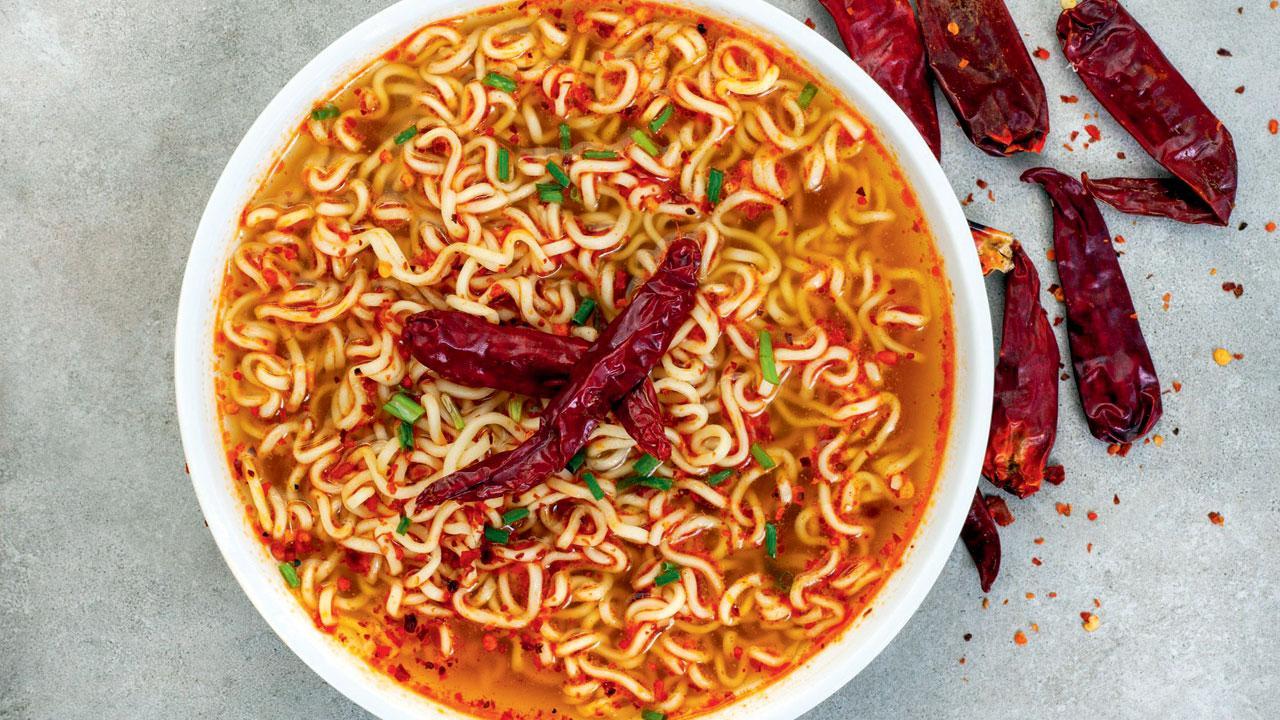Denmark has recalled from the market spicy ramen noodles by a South Korean company. Does this mean eating extremely spicy can be poisonous?

Representation Pic
Three spicy flavours of Samyang’s instant noodles were recalled by Denmark’s food agency, which also urged customers to abandon packets they had at home. The issue is not the quality of the packaged noodles, but how spicy they are. To fans of chillies, this is odd.
Chillies have a chemical called capsaicin, which is gives them its heat. Eaten in recommended limits, it’s good for you. “Spicy foods boost metabolism and increase blood flow and blood circulation. Many spicy foods are also anti-inflammatory. Several weight loss drugs and supplements isolate the ingredients from spicy foods like capsaicin and cayenne peppers as they are good for you,” says Saleha Bawazir, a clinical nutritionist.

Renuka Pawar
On the other hand, hot foods are not ideal for those with acidity and gut issues. Bawazir enlightens, “It can cause loose motions, diarrhoea, and haemorrhoids; they can also cause extreme sweating, and spike blood pressure. Spicy food has a thermogenic effect, meaning it increases your body temperature, heart rate, and blood circulation.”
In India, where the tolerance for capsaicin is culturally higher, products with 10 to 15,000 Scoville Heat Units (SHU) like tabasco hot sauce are commonly available. Whereas Samyang’s spiciest noodle, the Bulduk 3X spicy ramen has 13,200 SHU.
“In every country, manufacturers know the highest spice tolerance levels and develop products accordingly,” says Renuka Pawar, a food scientist. She adds that many manufacturers now use capsaicin oleoresin in packaged food, which can have the highest levels of SHU. Oleoresin is a natural extract used as a flavouring agent, and the capsaicin oleoresin used in spicy noodles is what gives such products that fiery kick.
Speaking about what manufacturers must do for spicier than usual products, Pawar says, “Display a disclaimer on the label saying that this [the product] contains capsaicin oleoresin. Have a chart to explain how spicy the product is with several chillies, or mention that consumers should add one or two drops of the sauce. Consumers can decide how much heat level is suitable as per their tolerance.” Pawar confirms that Samyang’s range does mention how spicy the packet of ramen will be.

Saleha Bawazir
A higher tolerance for spice is culturally visible across Asia. But eating spicy foods causes micro cuts on the tongue. “A couple of black peppers, cayenne pepper or regular red chilli peppers shouldn't be poisonous nor should there be any side-effects. All Indians add green or red chillies to their food daily. It’s our cultural exposure that gives us a higher tolerance,” says Bawazir.
It’s no mystery that despite the repercussions of eating extremely spicy foods, people still crave chillies. Bawazir, who is also a certified nutrition psychologist, explains, “You feel your heart rate going up and your blood pressure spiking. So it's that adrenaline and endorphin rush that people enjoy and that's why they chomp on a green chilli along with their dal chawal.”
But it’s the rush that chillies bring that sparked challenges across social media. Several influencers posted videos of them eating Bulduk’s spicy ramen, which is also how the brand became exceedingly popular.
Bawazir points out that in Denmark, one person had acute poisoning and had to go to the ER. "So you have to understand that it is those isolated ingredients [like capsaicin oleoresin] that have a very high spice index. It has been specially added to this particular brand of noodles because the goal is to go as spicy as you can, as per the challenge,” she says.
While one packet is not going to be poisonous to consume, having it over a period of time can have consequences. Pawar believes Denmark is taking precautions. She says that over time, the levels of spice could cause acute problems, and the higher the spice levels go, the more the problems.
 Subscribe today by clicking the link and stay updated with the latest news!" Click here!
Subscribe today by clicking the link and stay updated with the latest news!" Click here!










